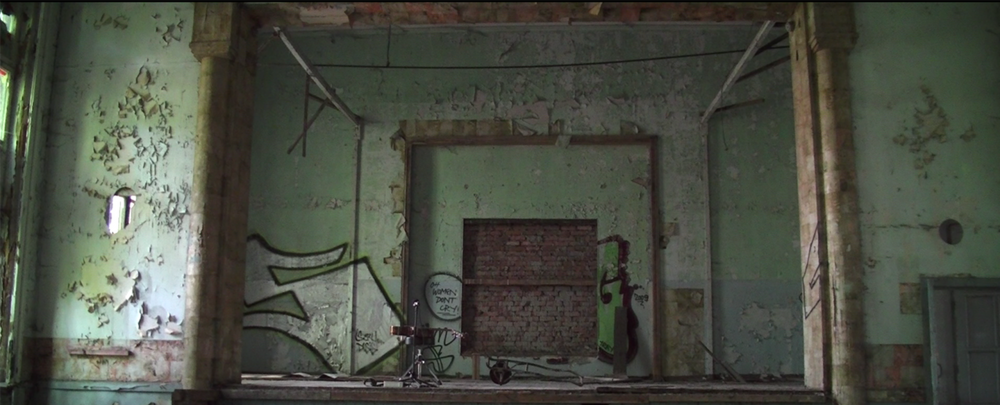Douglas MacGregor performs his guitar composition A Testament to Subsided Days at Beelitz Heilstätten – An abandoned sanatorium near Berlin which once had Hitler as a patient.
The night before recording this and the videos from other artists at Beelitz, I decided it would be a great idea to put a knife through the tip of my finger while cooking some food for the day ahead. There was a lot of blood and swearing and I thought that that would be me out of action for the foreseeable and that after all the organisation effort I had put it, I would not be able to play.
As the morning came however, I noticed that when wrapped in gauze and electrical tape the pain was only marginally unbearable, so, unable to accept defeat, I took my guitar with me anyway. I worked out that providing I didn’t use the tip of my finger I could just about play the guitar. All that was left to do was to take a couple of pain killers and hope that I would be able to improvise new fingering using only 3 fingers. Two takes and a many grimaces later, this was the result.
Beelitz Heilstätten
 Hidden romantically in the deutsche Wälder (woods) not far Potsdam, Beelitz Heilstätten
Hidden romantically in the deutsche Wälder (woods) not far Potsdam, Beelitz Heilstätten
conjures up a uniquely German image, a Zauberberg (Magic Mountain*) without the Berg (mountain). But beneath the decaying beauty, the history of Beelitz has been far from romantic.
In the late 19th Century tuberculosis was rife and in order to stop the spread of the disease, those inflected were encouraged to enter sanatoriums. Beelitz was one of many sanatoriums built to deal with the numbers and the 140 hector wooded site was chosen for it’s clean air, which was considered essential for the treatment of tuberculosis. Construction began in 1898 and the doors were opened to the first patients in 1902.
After the outbreak of World War I, the site was transformed into a military hospital, treating casualties from the trenches. It was during this time that the hospital received it’s most famous patient, one Adolf Hitler, after a grenade exploded a little too far away from him during the Battle of the Somme.
In the interwar period Beelitz became a Sanatorium again before being transformed back into a military hospital during the next World War and then being taken over by the Soviets, who carried on using Beelitz as a military hospital until 1995 when they abandoned it. A couple of the buildings remain still in use today, but the vast majority of the site lies in ruins, frequented by many photographers, film makers (including those that made the Pianist and Valkyrie) , urban explorers and Ramstein.
The Beelitz area is also famous for it’s asparagus and a serial killer.
We recorded this video in the large hall in the Männersanatorium (sanatorium for men).
If you can read German and want to learn more about Beelitz Heilstätten, this site is well worth visiting. Even if you can’t, it has some nice pictures. If not wikipedea or these nice blogs should suffice: Abandoned Berlin, Opacity.
*Zauberberg is a rather big novel written by Thomas Mann about a young German man who visits a sanatorium and, after a 1000 pages, leaves. ….but not before having been extensively lectured to by some weighty intellectuals.

